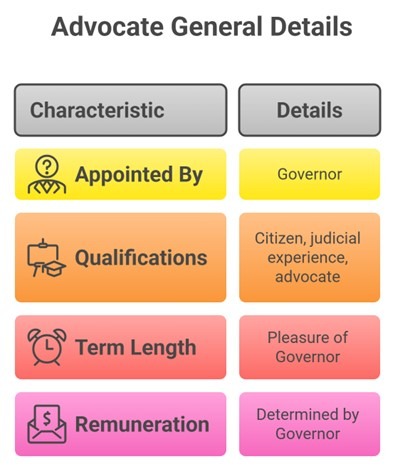Advocate General of the State
Advocate General of the State
The Advocate General is the highest law officer in the state, established under Article 165 of the Constitution of India. This position corresponds to the Attorney General at the national level and serves as a key legal advisor to the state government.
Appointment and Term
1. Appointment:
- The Advocate General is appointed by the Governorof the state.
- To qualify for this office, the individual must meet the following criteria:
- Be a citizen of India.
- Have held a judicial office for at least ten years, or
- Be an advocate of a High Court for a minimum of ten years.
2. Term of Office:
- The term of the Advocate General is not fixed by the Constitution; he holds office at the pleasure of the Governor.
- This means the Advocate General can be dismissed by the Governor at any time. He typically resigns when the council of ministers changes, as he is appointed based on their advice.
3. Remuneration:
- The salary and conditions of service for the Advocate General are not specified in the Constitution and are determined by the Governor.
Duties and Functions
As the chief legal advisor in the state, the Advocate General has several important functions:
1. Legal Advice:
- The Advocate General provides legal advice to the state government on matters referred to him by the Governor.
2. Other Legal Duties:
- He performs additional legal duties assigned by the Governor.
3. Constitutional and Statutory Functions:
- He discharges functions conferred upon him by the Constitution and any other relevant laws.
4. Court Appearance:
- The Advocate General has the right to appear before any court of law within the state, representing the state government.
5. Legislative Participation:
- He can participate in discussions in both Houses of the state legislature or any committee but does not have voting rights.
- The Advocate General enjoys the same privileges and immunities as members of the state legislature.
Articles Related to Advocate General of the State
Article No. | Subject-matter |
165 | Advocate-General of the State |
177 | Rights of Advocate-General as respects the Houses of State Legislature and its Committees |
194 | Powers, privileges, and immunities of Advocate-General |
Articles Related to Constitutional Bodies
The Advocate General is part of a wider framework of constitutional bodies established in India, including:
Article No. | Constitutional Bodies |
76 | Attorney-General of India |
148 | Comptroller and Auditor-General of India |
165 | Advocate-General of the State |
243-I | State Finance Commission |
243-K | State Election Commission |
243ZD | District Planning Committee |
243ZE | Metropolitan Planning Committee |
263 | Inter-State Council |
279A | Goods and Services Tax Council |
280 | Finance Commission |
307 | Inter-State Trade and Commerce Commission |
315 | Union Public Service Commission and State Public Service Commission |
324 | Election Commission |
338 | National Commission for Scheduled Castes |
338A | National Commission for Scheduled Tribes |
338B | National Commission for Backward Classes |
339 | Scheduled Areas and Scheduled Tribes Commission |
340 | Backward Classes Commission |
344 | Official Language Commission and Official Language Committee of Parliament |
350B | Special Officer for Linguistic Minorities |
The Advocate General of the State plays a pivotal role in the legal framework of the state government, offering essential legal guidance and representation. His powers and responsibilities, while not constitutionally defined in terms of tenure and remuneration, make him a significant figure in ensuring the state government operates within legal bounds. The Advocate General’s participation in legislative proceedings and rights to advise further emphasizes the importance of legal oversight in governance.


